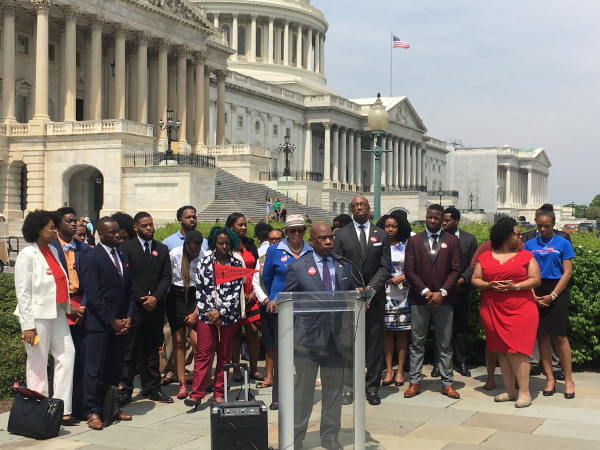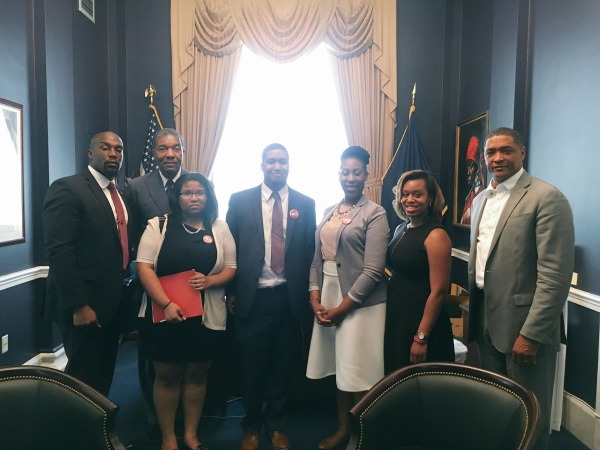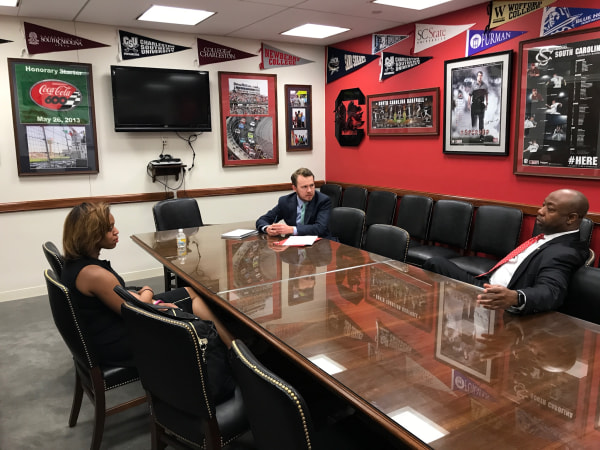OpEd by Krishana Davis
NBC News NBCBLK, April 28, 2017 —
We are mere hours from the end of the first 100 days of Donald Trump’s administration, which has proven to be an administration marred by xenophobia, assaults on the female reproductive system, and the confirmation of an attorney general with a history of voter discrimination and voter suppression.
And, perhaps one of the most jarring sentiments is the blatant attempt to discredit or erase the importance, history and impact of historically black institutions of higher learning in this country.
Following Trump’s Secretary of Education pick Betsy DeVos calling HBCUs “pioneers” of “school choice,” negating the history of institutional racisms, Jim Crow laws, bigotry and hatred that barred black students from attending Predominately White Institutions (PWIs), we are left wondering: will this administration continue to erase and demean blackness?

Morgan State University President Dr. David Wilson said, “it’s time for HBCUs to get more than crumbs,” during the HBCU Collective’s HBCU National Day of Action on Capitol Hill on Thursday, April 27, 2017. HBCU Collective
And frankly, we’re not willing to sit around twiddling our fingers to find out.
While Trump’s meeting with the presidents and chancellors of History Black Colleges and Universities showed a good faith effort from the White House to hear the concerns of black colleges and universities and the executive order moving the White House Initiative on Historically Black Colleges and Universities under the purview of the president is promising, it doesn’t amend the apathy many HBCU students and alumni continue to feel about this administration making good on its promises.
The gesture of Trump’s executive order on HBCUs is just that a gesture.
It is a conversation starter on the many issues the Trump administration is either facing or creating. It doesn’t make Trump more amicable to blacks; it’s a starting point to a larger conversation around how this country handles issues around the black community.
We can’t dismiss the rift between the black community and the U.S. Department of Justice nor turn a blind eye to black Muslims being impacted by the travel ban nor how proposed changes to the Affordable Care Act would have a crippling impact in healthcare access in the black community. It’s an assault at all fronts.

Leaders and members of the HBCU Collective meet with Congressional Black Caucus Chair U.S. Representative Cedric Richmond. HBCU Collective
But the time is ripe for us to act. For us to hold our elected officials’ feet to the fire and to ensure that our issues are included in this “new wave” of grassroots advocacy.
And as alumni and students of Historically Black Colleges and Universities we will no longer be silent and watch our institutions become neglected nor erased. Our university presidents and chancellors have done their part, advocating for our historically black institutions of higher learning. But the time is now for us – the alumni and student – to carry the torch. We must do our part in providing a true national voice to call for the preservation of the history of and to grow Historically Black Colleges and Universities.
Which is why the HBCU Collective was founded.
We can no longer think about our HBCUs only when it’s time to come back onto the yard every homecoming or Battle of the Bands. We are in a state of emergency.

Krishana Davis, co-leader of the HBCU Collective, met with Senator Tim Scott to urge him to support year-round Pell Grants, financial support for students that can help to close the racial wealth gap. HBCU Collective
The wealth income gap between black students and their white counterparts continues to expand causing great financial needs for black students vying to obtain a higher education. The median white household has $13 in net wealth for every dollar held by the median black household, according to the Survey of Consumer Finances.
So when we talk college affordability, we must understand that HBCUs disproportionately graduate first-generation college students from low-income families. Yet HBCUs have one-eighth of the endowment of PWIs. More than 75 percent of all HBCU students rely on Pell Grants to meet their college expenses.
Historically Black Colleges and Universities like Morgan State University graduate the majority of black engineers, and 70 percent of all black doctors are HBCU grads. Yet many HBCUs are lacking federal funds for state-of-the-art innovation labs and STEM technology to ensure black students can compete in an ever-evolving 21st Century global workforce and economy.
As HBCU alumni and students, the HBCU Collective is asking members of Congress to prioritize federal funding for Historically Black Colleges and Universities in the budget cycle this year, and beyond. To adequately educate students at the more than 100 HBCUs across the country, we are urging members of Congress to:
- Increase federal funding for student aid, specifically year-round Pell Grants
- Increase funding for federal research grants
- Increase federal funding for facility upgrades.
We want the Trump administration and Congress to realize that HBCUs matter. That the lives of their students matter. And that the lives of the greater black community matters.
Krishana Davis is a co-founder of the HBCU Collective, a group of alumni and students who attended Historically Black Colleges and Universities advocating state and federal officials to preserve the history of and grow historically black institutions of higher education. Krishana is a writer, recovering reporter seen in the Baltimore Sun and BBC, and communications professional focusing on women’s issues, education and social justice. She is a graduate of Morgan State University.










